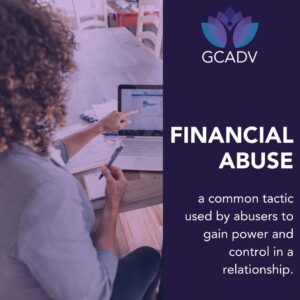
Often times, the number one reason that a victim of domestic violence doesn’t leave an abusive relationship is because of finances. This could be because their partner controls all of the finances and if they leave, they will have no access to essential funds things like food and housing. In some cases, the financial abuse is present throughout the relationship and other cases the abuse begins when the survivor is attempting to leave or has left the relationship. Women living in poverty experience domestic violence at twice the rate of those who do not, which furthers the reciprocal relationship between abuse and economic hardship (NNEDV).
Learn more about GCADV’s Economic Justice Program and Don’t Knock The Hustle Mini Grant Program.
FINANCIAL ABUSE TACTICS:
- Forbidding the victim to work.
- Sabotaging work or employment opportunities by stalking or harassing the victim at the workplace or causing the victim to lose her/his job by physically battering prior to important meetings or interviews.
- Forbidding the victim from attending job training or advancement opportunities.
- Controlling how all of the money is spent.
- Not including the victim in investment or banking decisions.
- Not allowing the victim access to bank accounts.
- Withholding money or giving “an allowance.”
- Forcing the victim to write bad checks or file fraudulent tax returns.
- Running up large amounts of debt on joint accounts.
- Refusing to work or contribute to the family income.
- Withholding funds for the victim or children to obtain basic needs such as food and medicine.
- Hiding assets.
- Stealing the victim’s identity, property, or inheritance.
- Forcing the victim to work in a family business without pay.
- Refusing to pay bills and ruining the victims’ credit score.
- Forcing the victim to turn over public benefits or threatening to turn the victim in for “cheating or misusing benefits.”
- Filing false insurance claims.
- Refusing to pay or evading child support or manipulating the divorce process by drawing it out by hiding or not disclosing assets.
EFFECTS:
- Victims of financial abuse lose a total of 8 million days of paid work each year.
- The lack of paid sick days or other job protections prevents survivors from taking time off work to recover from injury, seek safety, or pursue a court case.
- The total annual cost of domestic violence in the U.S. in 2015 was estimated to be $8.9 billion. Approximately $6.3 billion of these costs were for direct medical and mental health services.
- The medical costs for survivors of emotional abuse, assault, or rape range from $1,017 to $2,665 per incident. Health care costs are 42% higher for domestic violence survivors.
- Experiencing violence can have a long-term impact upon financial security. A 2000 survey estimated an average lifetime income loss of $36,000 for teen victims of sexual violence, (equivalent to $52,242 in 2017) due to decreased educational achievement, necessary sick leave, and impact on career trajectory.
- A survivor may be forced to stay with an abuser due to concerns about economic stability. In a 2012 survey, three out of four victims said they stayed with their abusers longer for economic reasons.16 Of the 85% of victims who returned to their abusers, a significant number cited an inability to address their finances.
- In a 2012 Cornell study, over 30% of responding domestic violence services reported that more than a quarter of their clients were prohibited from opening a bank account or had their credit score lowered because of economic abuse. In the same study, one in three responding programs reported that fewer than 10% of their clients had an independent credit card. Among those victims who did not have an independent credit card, 60% said that it was because their partner withheld documents from them, or otherwise prevented them from opening a credit account.
REBUILDING FROM FINANCIAL ABUSE:
- Seek help from a trained domestic violence advocate by calling the National Domestic Violence Hotline at 1-800-799-SAFE.
- Find local resources and hotlines through gcadv.org/domestic-violence-centers/
- Gather as much financial information as is safe. This includes photos or hard copies of legal or financial documents such as birth certificates, credit card statements, social security cards, and health records.
- Make a plan about where to go (stay with family, locate a shelter, rent an apartment, etc.) and determine a budget of realistic costs after leaving an abuser.
- Consider an order of protection from your abuser. An order of protection can offer survivors economic reliefs such as child support, mortgage or rent assistance, and temporary possession of property.
ADDITIONAL RESOURCES:
- Learn more about the intersection of domestic violence and financial abuse from NNEDV’s Economic Justice Project.
- Find state-specific workplace protections for survivors at WomensLaw.org
- MOVING AHEAD: A FINANCIAL EMPOWERMENT RESOURCE – SELF PACED COURSE
- REGISTER
- This course is brought to you by National Gender Based-Violence Learning Community and has been designed to help domestic violence survivors achieve financial independence and rebuild their lives. The curriculum covers a variety of important financial topics including budgeting, managing debt and improving credit and has been proven to help survivors move from short-term safety to long-term security
Reference: National Network to End Domestic Violence
